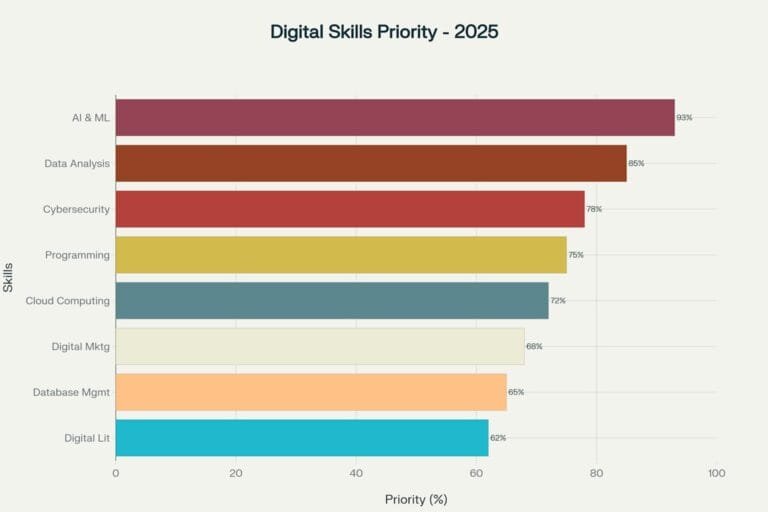The digital skills revolution isn’t on its way; it’s already here. As a career development professional, I’ve seen first hand how the landscape of essential workplace skills has shifted fundamentally. What were once “nice-to-have” technical abilities have now become non-negotiable requirements across virtually every industry.
In the UK, the scale of this transformation is staggering: 7.5 million people, or 18% of UK adults, lack the essential digital skills needed for the workplace, with only 48% able to complete all 20 basic digital tasks that industry and government agree are essential for work. The business impact is equally stark – 72% of UK businesses have vacancies for workers with digital skills, and 68% find it challenging to hire the digital workers they need. Even among unexpected demographics, the gaps are shocking. One in five people working in the tech sector itself lack all essential digital skills.
The economic consequences are dramatic – the UK digital skills gap costs the economy £63 billion per year, while research from FutureDotNow and the Centre for Economic and Business Research shows that building essential digital skills could boost the UK economy by more than £23 billion annually.
Elsewhere in Europe, the European Commission reports that 90% of jobs across all sectors will require basic digital skills by 2030, while 93% of employers expect to use generative AI in the workplace within five years. Yet here’s the reality. Despite this overwhelming demand, 4 out of 10 adults in Europe lack basic digital skills, and over 70% of businesses say the lack of staff with adequate digital skills is an obstacle to investment.
While it is easy to be alarmed by this data, the current situation presents an unprecedented opportunity for professionals who are willing to invest in developing these capabilities.
The Digital Skills Gap: The Most Wanted Digital Skills By Employers
The data reveals a clear hierarchy of digital skills that employers prioritise in 2025. Through an analysis of recent research from the World Economic Forum (WEF), the European Commission, McKinsey, and LinkedIn, several key trends emerge that every professional should be aware of. The World Economic Forum’s latest research shows that AI and big data lead the fastest-growing skills list, followed closely by data analysis, cybersecurity and programming. Let’s take a closer look at these digital skills most wanted by employers.

Artificial Intelligence and Machine Learning. The demand for AI-related capabilities has reached critical levels. 66% of leaders say they wouldn’t hire someone without AI skills, and 71% would rather hire a less experienced candidate with AI skills than a more experienced candidate without them. This represents a fundamental shift in how employers evaluate talent. AI skills represent the fastest-growing area of demand, but this category extends far beyond technical programming.
Machine learning algorithm development, data processing and preprocessing, and model evaluation form the technical foundation. However, equally important are skills in AI ethics, prompt engineering for generative AI tools, and understanding how to integrate AI solutions into existing business processes. The key insight here is that you don’t need to become a PhD-level researcher to benefit from AI skills. Many valuable roles involve AI-human collaboration rather than pure AI development.
Data analysis and visualisation skills remain consistently high in demand across all sectors. From healthcare to marketing to finance, companies need professionals who can not only gather data but also interpret it, tell compelling stories, and drive smart decisions. The ability to work with tools like SQL, Python, R, Tableau, and Power BI has become as fundamental as email proficiency was a decade ago.
Cybersecurity expertise has emerged as a critical infrastructure for business operations. With global cybercrime damages projected to reach $10.5 trillion annually by 2025, organisations are desperately seeking professionals who understand threat intelligence, risk analysis, intrusion detection and incident response. Cybersecurity professionals need both technical expertise in networks and systems, as well as strategic thinking about organisational security. What makes cybersecurity especially appealing is its blend of technical complexity and business significance. Professionals in this field must understand both the technical aspects of cyber threats and how to effectively communicate risks and solutions to business stakeholders.
Programming and Software Development. While not every professional needs to become a full-time developer, basic programming literacy has become essential across many roles. Python leads the list of most in-demand programming languages, with 45.7% of recruiters looking to hire Python developers12. JavaScript and Java remain consistently popular for web development and enterprise applications. The strategic approach to programming skills depends on your career goals. For many professionals, learning enough Python to automate routine tasks or analyse data provides significant value without requiring full software engineering expertise.
So, what now? Recognising these common downsides is the first step towards taking action. In this next section, I’ll share some practical strategies for overcoming meeting overload.
Taking Stock of Your Skills Before You Upskill
Before you jump into new courses or certifications, pause and get a clear picture of where you stand today. Digital transformation moves quickly, but an honest self-assessment keeps you from wasting time on areas you’ve already mastered—or overlooking hidden strengths that could give you an edge.
The most crucial digital skills needed in the workplace today include proficiency with Microsoft Office (Word, Excel, PowerPoint, Outlook), confident use of email and internet browsers, effective file management (including cloud storage & sharing), and the ability to navigate video conferencing and collaboration platforms like Teams or Zoom. Additionally, employers expect strong digital safety awareness, basic troubleshooting abilities, and adaptability to new digital tools and software.
Create a Personal Skills Inventory
- List all of the digital tasks you handle comfortably—everything from building spreadsheets to writing simple scripts or managing cloud files. Be specific, including the different tools and platforms you use.
- Note the tasks you avoid or delegate; they often reveal hidden skill gaps.
- Ask colleagues, mentors, or direct reports what digital strengths they see in you and where they think you could develop.
- At the end of your inventory, include any knowledge, skills and qualifications gaps you have uncovered.
- Decide which skills you need to develop and create an action plan.
Map Skills to Current Opportunities and Your Industry’s Future
- Look at trend reports, professional-body newsletters, and recent job ads in your field.
- Identify any recurring tools, competencies and certifications.
- Understanding which technologies your sector is adopting helps you concentrate your learning on areas that will provide the greatest benefits.
Identify & Develop Your Transferable Skills and Strengths
In a constantly changing world of work, it’s important to be aware of and continually develop your transferable skills and strengths to enhance your adaptability. Project planning skills naturally transfer into Agile product or Scrum roles (but you may still require certification). Analytical experience, whether in finance, logistics, or research, forms a strong foundation for data science. Clear communication and effective stakeholder management remain invaluable when translating technical insights into actionable business outcomes.
Prioritise High-Impact Gaps
- Highlight the skills that appear both in your “needs improvement” list and in your industry’s projected demand.
- Rank them by relevance to your current role or desired career move. Start with one or two high-leverage areas rather than tackling everything at once which can be overwhelming and difficult to achieve.
Conclusion
However, having supported hundreds of professionals through successful digital skills transitions, I can tell you that the key to thriving in this new world of work isn’t just about learning new tools. It’s about developing a strategic approach to career development that aligns with market demands while leveraging your existing strengths. Together, building digital competencies and leveraging strengths are key to fostering career resilience, a topic that will be discussed further in the next post.
Need help?
Are you struggling with digital skills development and want to work with a specially trained and experienced career and executive coach?
Get in touch for a free discovery call to discover how coaching can support you in reaching your goals and thriving in the digital skills revolution.

Lisa LaRue, MCareerDev, RCDP, MAC
Career & Executive Coach | Career Development Consultant | EMCC-Accredited Master Practitioner Coach (EIA) and Coach Supervisor (ESIA) and CDI-Registered Career Development Professional (RCDP) with over 20 years’ experience helping achieve successful and fulfilling careers. With a passion for human flourishing, Lisa is also a part-time doctoral researcher of flow, performance and wellbeing at work.





